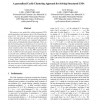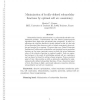198 search results - page 24 / 40 » Colouring, constraint satisfaction, and complexity |
114
click to vote
CP
2003
Springer
15 years 6 months ago
2003
Springer
A binary constraints network consists of a set of n variables, defined on domains of size at most d, and a set of e binary constraints. The binary constraint satisfaction problem ...
106
click to vote
CP
2008
Springer
15 years 3 months ago
2008
Springer
Abstract. While the efficiency and scalability of modern SAT technology offers an intriguing alternative approach to constraint solving via translation to SAT, previous work has mo...
GECCO
2004
Springer
15 years 7 months ago
2004
Springer
We discuss the computational complexity of random 2D Ising spin glasses, which represent an interesting class of constraint satisfaction problems for black box optimization. Two ex...
151
Voted
ICTAI
2009
IEEE
14 years 11 months ago
2009
IEEE
We propose a new method for solving structured CSPs which generalizes and improves the Cyclic-Clustering approach [4]. First, the cutset and the tree-decomposition of the constrai...
137
click to vote
CONSTRAINTS
2008
15 years 1 months ago
2008
Submodular function minimization is a polynomially-solvable combinatorial problem. Unfortunately the best known general-purpose algorithms have high-order polynomial time complexi...


